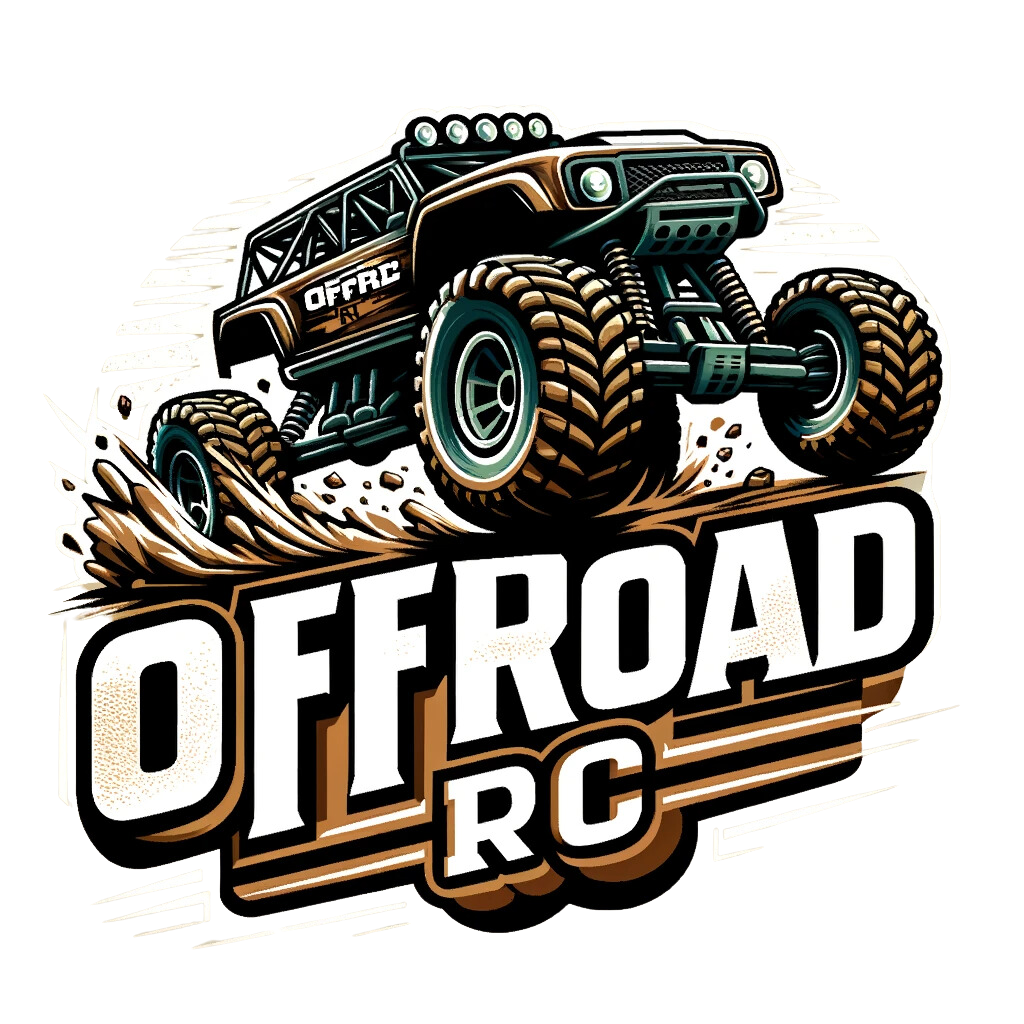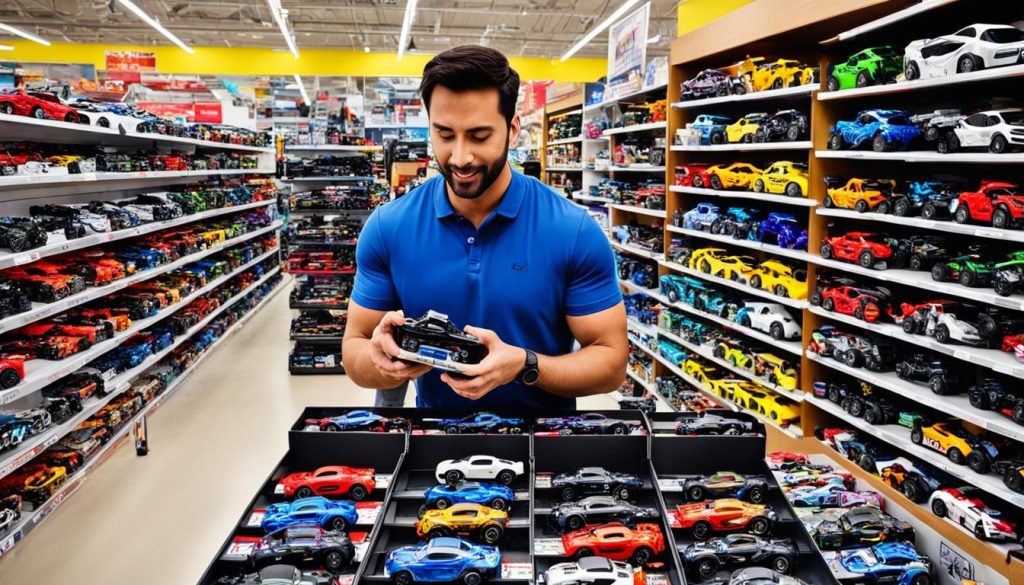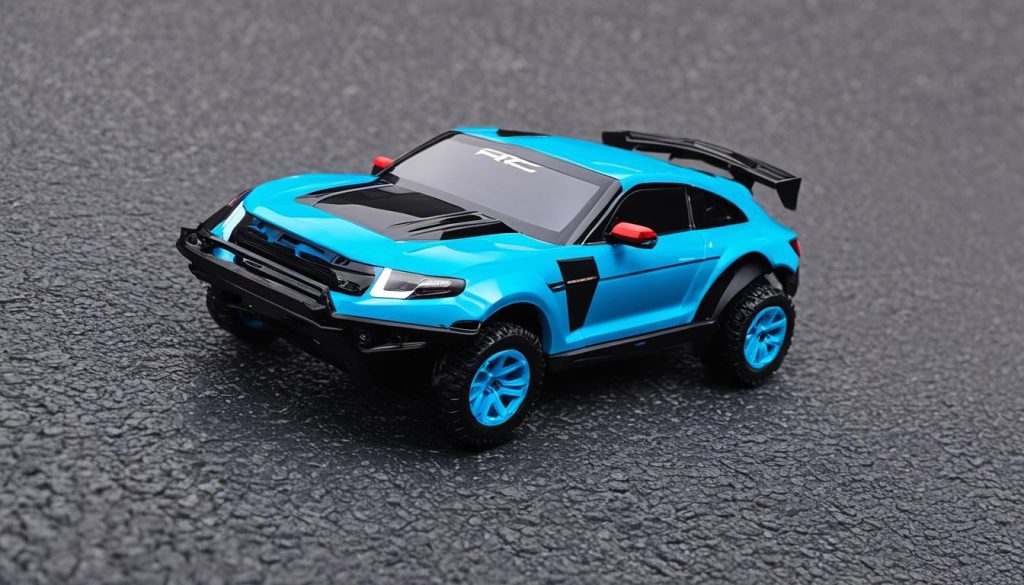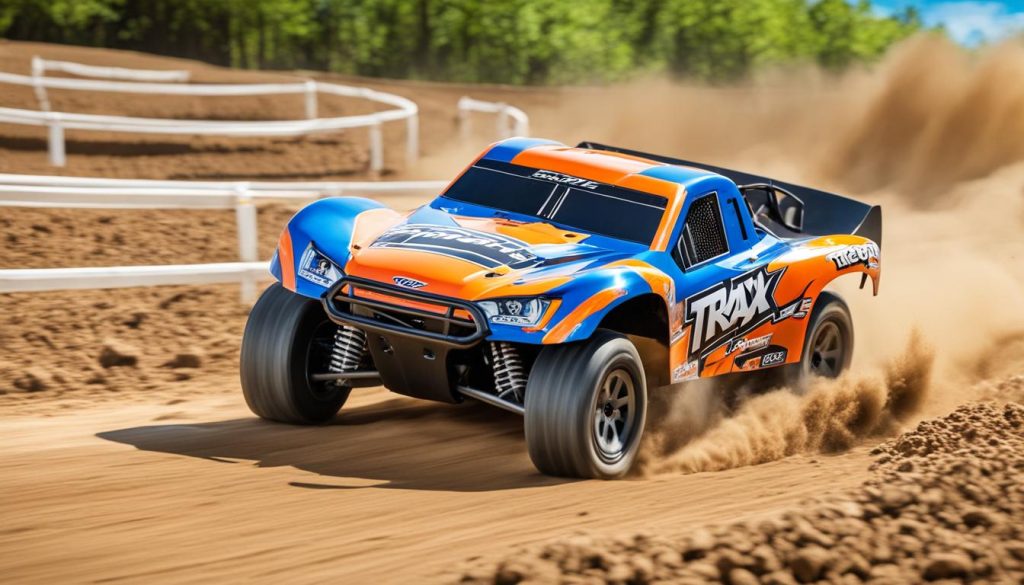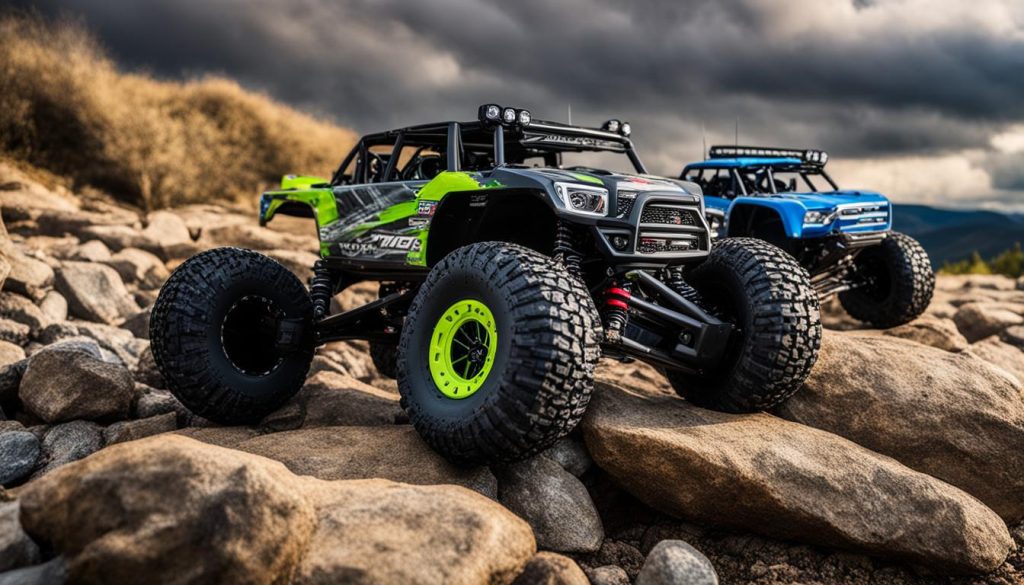Are you considering buying a remote control car? Whether you’re a beginner or a seasoned enthusiast, finding the right RC car involves careful consideration of several key factors. By understanding what to look for, you can make an informed decision and ensure that your new RC car meets your expectations.
Key Takeaways:
- When buying a remote control car, consider the type of car (off-road or on-road), scale, battery type, drive system, spare parts availability, and brand.
- Off-road RC cars are designed for rough terrains, while on-road RC cars are built for racing or touring purposes.
- The scale of an RC car refers to its size compared to a real car, with 1/10 scale being the most common.
- RC cars can be powered by NiMh or LiPo batteries, each offering unique advantages in terms of weight, run time, and power output.
- Choose between 2WD and 4WD based on factors such as control, agility, and the intended use of the RC car.
Types of RC Cars: Off-Road vs On-Road
RC cars come in different types, each designed for specific purposes and terrains. The main categories of RC cars are off-road and on-road vehicles.
Off-road RC cars are built to handle rough terrains and provide an exhilarating driving experience. These vehicles are equipped with robust suspension systems and rugged tires, allowing them to conquer various obstacles. Off-road RC cars include:
- Monster trucks: These powerful beasts are known for their massive tires and impressive suspension systems. They can handle jumps, bumps, and rough terrains with ease.
- Buggies: Designed for speed and agility, buggies are lightweight and have excellent maneuverability. They are perfect for racing on dirt tracks and rough terrain.
- Short course trucks: Similar to buggies, short course trucks are built for speed and durability. They feature a wide stance and high ground clearance, making them ideal for off-road racing.
- Rock crawlers: These specialized vehicles are designed to climb rocks and conquer challenging terrains. With their flexible suspension and high torque motors, rock crawlers can tackle steep inclines and rough surfaces.
On the other hand, on-road RC cars are built for speed and racing on smooth surfaces. These vehicles are optimized for high-speed performance and precise handling. There are different types of on-road RC cars, including:
- Racing cars: Built for speed, racing cars are designed specifically for on-road racing. They feature aerodynamic bodies, low profiles, and high-performance components.
- Touring cars: Similar to racing cars, touring cars are designed for high-speed racing on paved tracks. They offer excellent handling and stability, making them popular among racing enthusiasts.
- Drift racers: These specialized on-road RC cars are built for sideways sliding and controlled drifts. They have unique tires that allow for smooth and controlled power slides.
Choosing between off-road and on-road RC cars depends on your preferences and intended use. If you enjoy conquering rough terrains and tackling obstacles, an off-road RC car like a monster truck or rock crawler would be a great choice. On the other hand, if you prefer high-speed racing or precise maneuvering, an on-road RC car like a racing car or touring car might be more suitable for you.
Scale of RC Cars
The scale of an RC car refers to its size compared to a real car. The most common scale is 1/10, which means the RC car is one-tenth the size of a real car. This scale offers a good balance between size, performance, and cost. Larger scale cars, such as 1/8 or 1/5, may seem appealing due to their realistic size, but they can be more expensive and have limited availability of spare parts.
Starting with a common scale like 1/10 ensures that you have a wide range of spare parts and accessories readily available in the market. This availability of spare parts is crucial for maintenance and upgrades, especially for beginners who might encounter crashes or wear and tear.
Choosing an RC car in the 1/10 scale allows you to easily find replacement parts, whether it’s tires, suspension components, or other essential parts. It also opens up a variety of upgrade options, allowing you to customize your RC car to your liking.
Comparison of RC Car Scales
| Scale | Size Comparison | Availability of Spare Parts | Upgrade Options |
|---|---|---|---|
| 1/10 | One-tenth the size of a real car | Wide availability | Extensive customization options |
| 1/8 | One-eighth the size of a real car | Limited availability | Limited upgrade options |
| 1/5 | One-fifth the size of a real car | Limited availability | Restricted range of upgrades |
As seen in the comparison table, choosing the 1/10 scale offers the best balance between size, spare parts availability, and upgrade options. So, whether you’re a beginner or an experienced enthusiast, starting with a 1/10 scale RC car is a smart choice.
Battery Types for RC Cars: NiMh vs LiPo
One of the crucial considerations when buying an RC car is the type of battery it uses. Most modern RC cars are powered by electric motors and utilize either NiMh (Nickel-metal hydride) or LiPo (Lithium polymer) batteries. Each type has its own advantages and characteristics, influencing the overall performance and experience of the RC car.
NiMh Batteries: NiMh batteries are widely used in RC cars and have been a popular choice for many years. They are known for their reliability and cost-effectiveness. NiMh batteries tend to be heavier than LiPo batteries but offer a longer lifespan. These batteries provide consistent performance throughout their discharge and are less prone to swelling. They are also more forgiving when it comes to charging and require less maintenance compared to LiPo batteries.
LiPo Batteries: LiPo batteries are gaining popularity among RC enthusiasts due to their superior performance capabilities. They are lighter and can store more milli-amp hours (mAh), allowing for longer run times compared to NiMh batteries. LiPo batteries also deliver higher voltage, translating to increased power output and improved acceleration. However, LiPo batteries require specialized care during charging and discharging to prevent overcharging, swelling, or possible fire hazards. It is essential to use a LiPo-specific charger and monitor the battery’s voltage levels to ensure safe and optimal operation.
When deciding between NiMh and LiPo batteries for your RC car, several factors should be considered:
- Budget: NiMh batteries are generally more affordable than LiPo batteries, making them an attractive option for those on a tight budget.
- Desired Performance: If you prioritize longer run times, increased power output, and improved acceleration, LiPo batteries are the recommended choice.
- Charging Preferences: If you prefer batteries that are more forgiving during charging and require less monitoring, NiMh batteries are a suitable option. However, if you are willing to invest the time and effort to properly handle LiPo batteries, the performance benefits they offer might outweigh the additional precautions.
Before making a decision, it’s important to check if the RC car you are interested in is compatible with the battery type you prefer. Manufacturers often specify the recommended battery types for optimal performance. Additionally, consider your skill level, intended use of the RC car, and personal preferences when choosing between NiMh and LiPo batteries.
Overall, both NiMh and LiPo batteries have their own advantages and considerations. It’s important to weigh the pros and cons based on your specific needs and preferences. Selecting the right battery type will contribute to the overall performance and enjoyment of your RC car.
2WD vs 4WD RC Cars
When it comes to choosing a remote control car, one of the key decisions you’ll need to make is whether to go for a 2WD (two-wheel drive) or a 4WD (four-wheel drive) model. Each option has its own advantages and considerations based on your control, agility, and affordability preferences.
Control and Stability
When it comes to control and stability, 4WD RC cars have the upper hand. With power distributed to all four wheels, these cars provide better traction and handling, particularly when driving off-road. Their extra stability makes them ideal for tackling uneven terrains, such as dirt tracks or rocky landscapes.
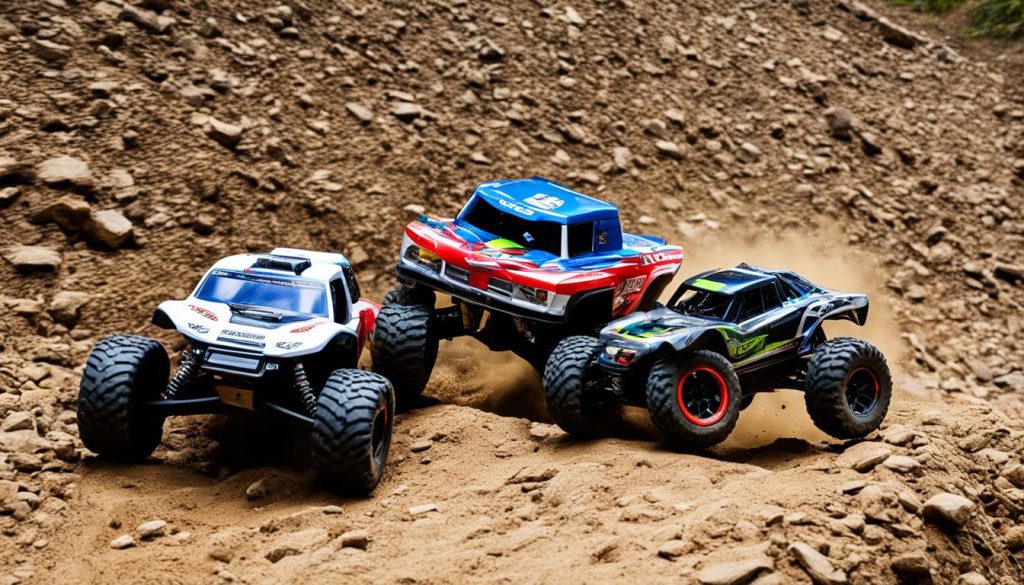
Agility and Speed
If you’re looking for a car that prioritizes agility and speed, 2WD RC cars are a great choice. With power delivered to only two wheels, these cars are lighter and more maneuverable, allowing them to take sharper turns and accelerate faster. They’re often the preferred option for those interested in racing or performing tricks and stunts.
Affordability
Another factor to consider is affordability. Generally, 2WD RC cars tend to be more budget-friendly than their 4WD counterparts. This makes them an ideal option for beginners or those looking to enter the RC car hobby without breaking the bank. However, it’s important to note that the price range can vary depending on the brand, features, and overall quality.
| Factor | 2WD RC Cars | 4WD RC Cars |
|---|---|---|
| Control and Stability | May not have as much stability in rough terrains | Excellent control and stability, particularly off-road |
| Agility and Speed | Highly maneuverable and can reach faster speeds | Slightly less agile but offers great traction and stability |
| Affordability | Usually more cost-effective | Often pricier due to additional features |
Ultimately, the choice between a 2WD and 4WD RC car depends on your intended use and personal preference. If you’re seeking optimal control and stability, especially when tackling challenging terrains, a 4WD car may be the better choice. On the other hand, if you value agility and affordability, a 2WD car may suit your needs perfectly.
Spare Parts Availability
When purchasing an RC car, it’s essential to consider the availability of spare parts. Not all RC cars have the same range of spare or replacement parts, and this can significantly impact your experience as an RC car enthusiast. Whether you’re a beginner or an experienced driver, crashes and wear are inevitable, so it’s important to be prepared.
Before finalizing your purchase, it’s a good idea to research the availability of spare parts for the specific RC car model you’re interested in. Look for reputable sellers or manufacturers who offer a wide range of spare parts for their cars. This way, if something breaks or wears out, you can easily find a replacement part and get back to enjoying your RC car without any unnecessary downtime.
Budgeting for replacement parts is also crucial. Spare parts can add up, especially if you plan on driving your RC car frequently or in more extreme conditions. Consider setting aside a budget for spare parts to ensure that you can keep your RC car running smoothly and address any issues as they arise.
Upgrades for Improved Performance
As you gain experience and become more comfortable with driving RC cars, you may also want to consider upgrading certain parts to enhance the performance of your car. Upgrades can include things like high-performance motors, upgraded suspension systems, or advanced electronic components.
Upgrading your RC car can improve its speed, handling, and overall performance. However, it’s important to note that not all RC cars are created equal when it comes to upgradability. Some cars have a broader range of aftermarket parts and upgrades available, while others may have more limited options.
Before purchasing an RC car, take some time to research the availability of aftermarket parts and upgrades for that specific model. Look for brands and models that have a strong community of enthusiasts who create and share upgrades. This way, you’ll have plenty of options to choose from when you’re ready to take your RC car to the next level.
| Spare Parts Availability | Rating (out of 5) |
|---|---|
| Tamiya RC Cars | 4.5 |
| Traxxas RC Cars | 5 |
| Arrma RC Cars | 3.5 |
| Axial RC Cars | 3 |
| HSP RC Cars | 2.5 |
Ensuring the availability of spare parts and considering upgrades will help you enhance your RC car’s performance and extend its lifespan. By thoroughly researching the availability of spare parts and upgrades for your specific RC car model, you’ll be able to make an informed decision and enjoy the excitement of driving your RC car to the fullest.
Popular RC Car Brands
The RC car market boasts a wide variety of popular brands that cater to different budgets and preferences. These brands are known for producing high-quality RC cars that deliver exceptional performance and durability. When selecting an RC car, it is essential to research and consider the reputation, product range, and customer reviews of various brands. Let’s explore some of the most renowned RC car brands:
“Tamiya, Traxxas, Arrma, and Axial are among the top RC car brands in the market, offering a range of options for RC enthusiasts.”
Tamiya
Tamiya is a well-established name in the RC car world. They are known for their attention to detail and craftsmanship, offering a diverse lineup of RC cars and accessories. Whether you’re a beginner or an experienced driver, Tamiya has something to offer for every skill level and interest. Their cars are known for their reliability, durability, and ease of use.
Traxxas
Traxxas is another highly regarded brand that specializes in high-performance RC vehicles. They are renowned for their innovative designs, cutting-edge technology, and exceptional speed. Traxxas offers a wide range of RC cars, trucks, and boats, catering to both beginners and advanced users. Their products are known for their durability, power, and impressive performance.
Arrma
Arrma is a brand that focuses on producing durable, rugged, and high-performance RC cars renowned for their off-road capabilities. They offer a range of vehicles suitable for various terrains, including monster trucks, buggies, and rock racers. Arrma vehicles are designed to handle rough conditions with ease, delivering exhilarating driving experiences for RC enthusiasts.
Axial
Axial is a brand that specializes in rock crawlers and scale RC vehicles. They are known for their attention to detail, realistic designs, and advanced suspension systems, making their RC cars ideal for rock crawling enthusiasts. Axial offers a wide range of options for those who enjoy tackling challenging terrains and want a realistic off-road experience.
HSP
HSP is a brand that focuses on providing affordable RC cars without compromising on quality and performance. They offer a range of entry-level and intermediate-level RC cars, making it accessible for beginners to get started in the hobby. HSP RC cars are known for their durability, ease of use, and affordability, making them a popular choice among beginners and budget-conscious enthusiasts.
When considering an RC car brand, it’s important to determine your budget, desired features, and performance expectations. Brands like Tamiya, Traxxas, Arrma, Axial, and HSP offer a wide selection of RC cars to suit various preferences and budgets. By researching and considering the reputation and customer reviews of these brands, you can make an informed decision and find the perfect RC car for your needs.
| Brand | Specialization | Notable Models | Price Range |
|---|---|---|---|
| Tamiya | Wide range of RC cars and accessories | TT-02, Grasshopper, Lunch Box | $100 – $500 |
| Traxxas | High-performance RC vehicles | Slash, Rustler, X-Maxx | $200 – $1000+ |
| Arrma | Off-road RC cars and trucks | Granite, Typhon, Kraton | $150 – $600 |
| Axial | Rock crawlers and scale RC vehicles | SCX10, Yeti, Capra | $300 – $800 |
| HSP | Affordable RC cars | XSTR, Brontosaurus, Flying Fish | $80 – $250 |
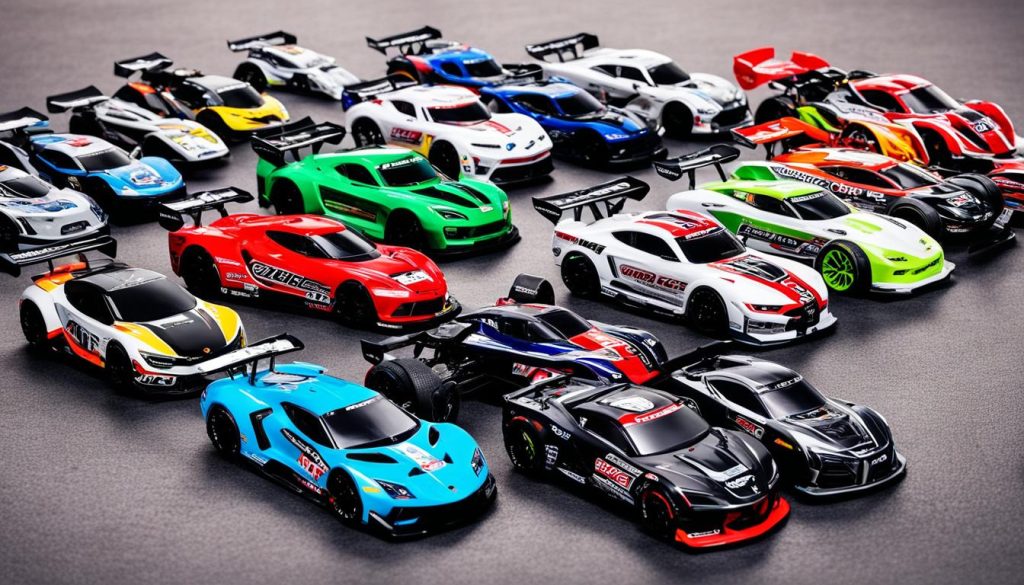
Recommended RC Cars for Different Budgets
When it comes to purchasing an RC car, your budget plays a significant role in determining the options available to you. Whether you’re looking for an affordable option or willing to invest in a high-end model, there are RC cars that cater to every budget. Let’s explore the recommended RC cars for different price ranges:
RC Cars Under $100
If you’re on a budget but still want a thrilling RC car experience, there are options available under $100 that offer decent performance. These affordable RC cars are perfect for beginners or those looking to get a taste of the hobby without breaking the bank. While they may not have all the advanced features of higher-priced models, they still deliver plenty of fun and excitement.
RC Cars $101-$200
In the $101-$200 price range, you can find a sweet spot with a good balance of features and quality. These mid-range RC cars offer improved performance, enhanced durability, and more advanced features compared to the budget options. Whether you prefer off-road or on-road driving, there are models available in this range that cater to different preferences.
RC Cars $201-$450
If you’re willing to invest more in an RC car, the $201-$450 range offers top-quality performance and durability. These RC cars are packed with advanced features, superior speed, and enhanced control capabilities. Whether you’re a serious racer or an experienced enthusiast, the models in this range deliver exceptional performance and an immersive driving experience.
RC Cars Over $450
For those seeking the ultimate RC experience, there are high-end models available for over $450. These RC cars are built to impress with cutting-edge technology, stellar performance, and unmatched durability. If you’re a dedicated hobbyist or a professional racer, these premium RC cars are designed to meet your highest expectations.
| Price Range | Key Features |
|---|---|
| Under $100 | Affordable, decent performance |
| $101-$200 | Good balance of features and quality |
| $201-$450 | Top-quality performance and durability |
| Over $450 | Ultimate RC experience, cutting-edge technology |
Remember that the price of an RC car is not the sole determinant of its quality and performance. It’s essential to consider your own preferences, intended use, and the specific features that matter most to you. Researching different models, reading customer reviews, and seeking recommendations from experienced enthusiasts can help you make an informed decision that best suits your needs and budget.
Tips for Buying the Right RC Car
When buying an RC car, it’s important to consider additional accessories such as spare tires, batteries, and chargers. These accessories play a crucial role in enhancing your RC car experience and ensuring optimal performance. To make an informed decision and select the right RC car for your needs, here are some essential tips:
1. Conduct Thorough Research
Before making a purchase, conduct thorough research on the specific model and brand you’re interested in. Read customer reviews, watch video demonstrations, and explore online forums to gain insights into the product’s quality, durability, and performance. This research will help you make an informed decision and choose an RC car that meets your expectations and requirements.
2. Consider Spare Tires
Investing in a complete set of spare tires is highly recommended when buying an RC car. Off-road driving or excessive use can cause wear and tear on tires, leading to decreased performance. By having spare tires on hand, you can quickly replace worn-out ones and ensure your RC car remains in top condition. Additionally, consider the availability and affordability of spare tires for the specific model you choose.
3. Choose the Right Batteries
The choice of batteries plays a crucial role in the performance and runtime of your RC car. While most RC cars come with standard batteries, it’s worth considering upgrading to high-quality batteries for longer run times and improved performance. LiPo batteries are known for their higher energy density, longer life, and lighter weight compared to NiMh batteries. However, they require proper care and specialized chargers. Evaluate your needs and budget to determine the best battery option for your RC car.
4. Emphasize Quality
When purchasing an RC car, prioritize quality over price. Investing in a well-built and durable RC car ensures a longer lifespan, better performance, and fewer maintenance issues. Look for reputable brands that have a track record of producing high-quality RC cars. Opting for a trusted brand may cost more initially, but it can save you money in the long run by reducing the need for frequent repairs or replacements.
“Investing in a well-built and durable RC car ensures a longer lifespan, better performance, and fewer maintenance issues.”
5. Consider RC Car Accessories
In addition to spare tires and batteries, there are various other RC car accessories you may need. These can include tools for maintenance and repairs, upgrade parts to enhance performance, and storage solutions to keep your RC car safe and organized. Assess your specific needs and budget to determine the necessary accessories that will enhance your RC car experience.
By following these tips and considering factors such as spare tires, batteries, research, and quality, you’ll be well-equipped to make an informed decision when buying an RC car. Remember to prioritize your preferences, intended use, and budget to ensure you choose an RC car that meets your expectations and provides endless hours of exhilarating fun.
Conclusion
When it comes to buying a remote control car, it’s important to consider several essential factors to make the best selection. Start by identifying the type of RC car that suits your needs, whether it’s an off-road monster truck or an on-road racing car. Next, determine the scale of the car, with 1/10 scale being a common and versatile option. Consider the battery type, choosing between NiMh and LiPo based on your budget and desired performance.
Additionally, decide between a 2WD or 4WD car, keeping in mind that 4WD offers better control and stability while 2WD provides agility and affordability. Spare parts availability is crucial, so choose a car that has a wide range of accessories and upgrades readily accessible. Lastly, research popular RC car brands like Tamiya, Traxxas, Arrma, Axial, and HSP, considering their reputation, product range, and customer reviews.
By focusing on these essential factors and conducting thorough research, you can confidently select the perfect RC car for your enjoyment and excitement. Whether you’re a beginner getting started or an experienced enthusiast looking to upgrade, this remote control car buying guide will help you make an informed decision. Get ready for endless hours of fun and adventure with your new RC car!
FAQ
What factors should I consider when buying a remote control car?
When buying a remote control car, you should consider factors such as the type of car, scale, battery type, drive system, spare parts availability, and brand.
What are the different types of RC cars available?
RC cars can be categorized as off-road or on-road. Off-road RC cars include types such as monster trucks, buggies, short course trucks, and rock crawlers. On-road RC cars are designed for racing or touring purposes, with some models made specifically for drifting.
What does the scale of an RC car refer to?
The scale of an RC car refers to its size compared to a real car. The most common scale is 1/10, meaning the RC car is one-tenth the size of a real car. Larger scale cars may be appealing but can be more expensive and have limited availability of spare parts.
What are the different types of batteries used in RC cars?
RC cars are powered by electric motors and use either NiMh (Nickel-metal hydride) or LiPo (Lithium polymer) batteries. NiMh batteries are heavier but more cost-effective, while LiPo batteries are lighter and offer longer run times and increased power output.
What is the difference between 2WD and 4WD RC cars?
RC cars can be either 2WD (two-wheel drive) or 4WD (four-wheel drive). 4WD cars are generally easier to control and offer better stability, especially when off-roading. 2WD cars are often more agile and affordable, making them a popular choice for beginners or those looking for speed.
How important is spare parts availability for RC cars?
It is important to inquire about the availability of spare parts for the RC car you’re considering buying. Not all cars offer the same range of spare or replacement parts. Budgeting for replacement parts is crucial as crashes and wear are inevitable, especially for beginners.
Which are the popular brands of RC cars?
The popular brands of RC cars include Tamiya, Traxxas, Arrma, and Axial. These brands have a reputation for producing high-quality RC cars, catering to different budgets and preferences.
What are the recommended RC cars for different budgets?
RC cars are available at various price points. For those on a budget, there are affordable options under $100. In the $101-$200 range, you can find a good balance of features and quality. RC cars in the $201-$450 range offer top-quality performance and durability. High-end models are available for over $450 for the ultimate RC experience.
What should I consider when buying an RC car?
When buying an RC car, you should consider additional accessories such as spare tires, batteries, and chargers. Conduct thorough research on the specific model and brand you’re interested in, and read customer reviews to ensure quality and performance.
What are the essential factors to consider when buying a remote control car?
Essential factors to consider when buying a remote control car include the type, scale, battery type, drive system, spare parts availability, and brand. By focusing on these factors and conducting thorough research, you can make the best decision when selecting an RC car.
